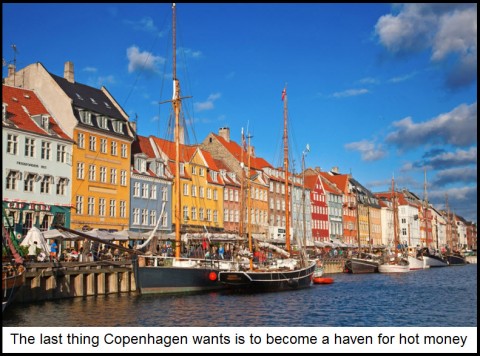Savers and retirees aren’t the only ones getting screwed by interest rates that have been artificially suppressed by central banks around the world. These days, banks themselves are finding it increasingly difficult to earn even a nominal return on instruments they consider safe. Just last week, Denmark’s Nationalbanken set its deposit rate below zero for the first time, effectively charging commercial banks and others a fee for parking their surpluses in krones. There are numerous reasons why the krone would be a magnet for idle money. For one, Denmark’s economy is among the strongest in Europe. Also, because Danes rejected euro-zone membership in 2000, they enjoy a degree of political and economic autonomy that their neighbors do not have. This will presumably make Denmark less susceptible to the shock waves that follow the inevitable implosion of Greece, Spain, Italy et al. Small wonder, then, that the global stewards of OPM would consider the krone a safe haven even though it now guarantees them at least a small loss on their money. From Denmark’s standpoint, the decision to follow the European Central Bank’s latest rate cut was unavoidable. The alternative would have been to sit idly by as the krone appreciated, hobbling the country’s exports and destabilizing its balance sheet.
Meanwhile, those who have been predicting hyperinflation should have noticed by now that the trillions of euros that have been injected into the banking system are having the opposite effect. For in fact, all those euros have merely weighed down the return on capital with a mountain of liquidity for which there has been no market demand. Moreover, as benchmark rates around the world sink below zero, the U.S. Fed’s vital objective of managing (i.e., promoting) inflationary expectations lies nakedly exposed as a failure. Under the circumstances, the odds of inducing inflation — other than a few days’ worth, perhaps, on the world’s bourses — seem to be growing increasingly remote. At the very least, negative rates do not bode well for the central banks’ efforts to keep a nearly quadrillion-dollar ($1,000,000,000,000,000) derivatives bubble from mutating into a deflationary black hole. It could do so simply because the income side of the bubble cannot indefinitely resist the gravitational pull of negative yields on risk-frees.
The Real Burden of Debt
Although we have been in the hard-core deflationist camp since the early 1990s and have written on the topic for publications including Barron’s and the San Francisco Examiner, we were persuaded more recently by the excellent arguments at FOFOA blogspot that hyperinflation was indeed possible if not inevitable. But for now the argument is moot, since it is clear that deflation is overwhelming the central banks’ collective efforts to keep the economies of the world from collapsing. As this drama unfolds, perhaps the best way to understand the hyperinflation/deflation conundrum is to think of the latter not as a decrease in the money supply as most economists do, but as an increase in the real burden of debt. In this respect, debt deflation is close to suffocating Europe’s economy and seems well capable of doing the same to America’s if the Fed should even hint that it might back off the credit throttle.
Flatlining on Barter
Inflationists would argue that the Fed simply won’t do that — that the central bank will supply whatever quantity of money is needed to keep the financial system liquid. Those who would rely on this outcome should keep in mind that nothing could conceivably be more deflationary than the prolonged bank holiday that might follow a global flash crash. Anyone who says this cannot happen is not someone whose investment advice you should rely on. Think it through yourself: Does it seem at all illogical that on the morning after a worldwide crash, our credit cards having ceased to work in a banking system suddenly bereft of trust, the economy would be running on a cash/bullion-or-barter basis? At that point Helicopter Ben would have the option of living up to his nickname. And although having the Fed add zeroes to our bank accounts, dispense crates of $100 bills to beleaguered households, and buy up all bonds in all markets might give rise to a fleeting hyperinflationary spike, it could be over so quickly that it would have little impact on an economy already flatlining on barter.
***
Making money in such treacherous markets is going to call for great patience and skill. Click here if you’d like to see how Rick’s Picks approaches this challenge.


Just wanted to add in my appreciation for Rich and many others that contribute to Rick’s forum, and you too Vlad. There are quite a few longtime regulars like fallingman, Steve, JohnJay, to name a few, that make this a place I visit daily and with an intention to read beyond Rick’s essay.
I suppose we should enjoy this while it lasts since it is likely on a closure list given the intensity of libertarian thought expressed here.
I am amazed by the way people still find ways to put their trust in the illusions, yes here too and yes, compensated or uncompensated…